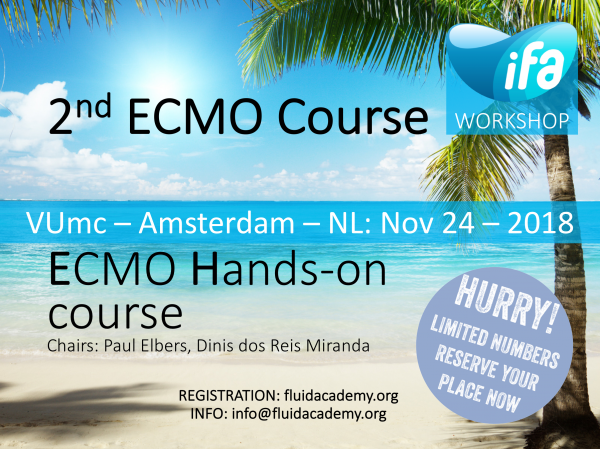
2nd ECMO course
IFAD ECMO and ECLS Hands-on course
2nd ECMO COURSE: Ecmo Hands-on course (Limited places during IFAD2018)
Date: Saturday, November 24th, 2018
Location: Amsterdam UMC, Location VUmc, De Boelelaan 1117, Amsterdam, The Netherlands
Room: TBA
Duration: Half Day 10:00 – 15:00
Pax: limited to a max of 8
Price: exceptionally low @ 200 EUR (meals and drinks included)
Comment: This workshop can only be booked in combination with attending the IFAD2018 meeting on Nov 23, 2018, at Pakhuis De Zwijger, Amsterdam, The Netherlands
Learning objective: This workshop will outline the basic principles of extracorporeal life support made easy by key-experts in the field. During the course delegates will gain a good understanding of ECMO in the following areas: Theoretical concepts, basic physiology and pathophysiology, cardiac and respiratory support and monitoring, alarm settings and monitoring, role of cardiac ultrasound during ECMO, newest technologies, circuits and devices, practical hands-on sessions and simulations.
Hands-on ECMO equipment training
Delegates will have the opportunity to have hands-on training in small break-out groups with ECMO equipment. Delegates will experience practicing insertion of cannulas on a mannekin, circuit surveillance, monitoring, alarm settings, simulations and trouble-shooting.
Key words
- Exclusive and limited course (only 8 participants)
- Cannulation for VV, VA and VAV ECMO/ECLS
- Cannulation for ECMO/ECLS support during CPR
- Hands on, hands on, hands on (guaranteed cannulation time)
- Interactive cases
- Includes refresher course lectures and updates
Course Director
Paul Elbers (Amsterdam, The Netherlands),
Faculty
Dinis dos Reis Miranda (Rotterdam, The Netherlands)
Target Audience
This course is for you if you work in intensive care medicine either as a consultant or trainee and already have at least some experience with ECMO/ECLS. Cannulation experience is not required as this will be the main focus of this course.
Preliminary Program
10.00 Refresher on VV and VA ECMO/ECLS
10.30 Indications and cannulation strategies
10.45 Hands-on cannulation
12.00 Lunch
12.30 ECMO/ECLS support for CPR
13.15 Hands-on cannulation
14.30 End of course
The course was made available via Unrestricted Educational Grants from Getinge and Xenios
Getinge AB is a Sweden-based company active in the healthcare sector. It provides products and services for intensive care units, sterilization centers, elderly care and companies and institutions active in the life sciences area. Its operations are divided into three business areas: The Medical Systems business area offers equipment for surgical disciplines, cardiology and intensive care; the Extended Care business area offers products and services geared toward the hospital and elderly care markets, including solutions for preventing the risk of pressure ulcers and deep vein thrombosis, and the Infection Control business area features systems for preventing the occurrence and spread of infection. Its products comprise disinfectors, sterilizers, including low temperature sterilization solutions, information technology (IT) solutions, as well as advice, training and technical support. The Company's products are sold under the Getinge, Lancer, ArjoHuntleigh and MAQUET brands. Product information: https://www.maquet.com/int/workspaces/operating-room/?filter=24
XENIOS is the therapy and technology leader in minimally invasive lung and heart assist. XENIOS’ novalung iLA, i–cor, and medos devices provide pulmonary and cardiac assist for a broad range of support levels on the unique XENIOS platform. XENIOS’ novalung iLA therapy is an adjunct or an alternative to injurious, immobilizing mechanical ventilation. XENIOS i-cor therapy is a novel less invasive heart assist therapy synchronized with the human heartbeat. These therapies enable caregivers to keep lung failure patients awake, self-determined and mobile while preventing ventilator-associated lung injury, pneumonia, and breathing muscle damage. Xenios is now integrated within Fresenius Medical Care. Product information: http://www.xenios-campus.com
Suggested reading and websites:
- ECLS guidelines for adult respiratory failure: https://www.elso.org/Portals/0/IGD/Archive/FileManager/989d4d4d14cusersshyerdocumentselsoguidelinesforadultrespiratoryfailure1.3.pdf
- ELSO guidelines for ECMO centres: https://www.elso.org/portals/0/igd/archive/filemanager/faf3f6a3c7cusersshyerdocumentselsoguidelinesecmocentersv1.8.pdf
- Alfred Health ECMO guidelines: http://www.alfredicu.org.au/assets/Documents/ICU-Guidelines/ECMO/ECMOGuideline.pdf
- Extracorporeal membrane oxygenation for severe acute respiratory failure in adults (NICE guideline): https://www.nice.org.uk/guidance/ipg391
- Extracorporeal membrane oxygenation (ECMO) for acute heart failure in adults (NICE guideline): https://www.nice.org.uk/guidance/ipg482
- European Society of Cardiology
- National Specialised Commissioning Team on ECMO
- ExtraCorporeal Life Support Organisation
picture courtesy http://wlpapers.com/sea-palm-beach.html#gal_post_8323_sea-palm-beach-1.jpg